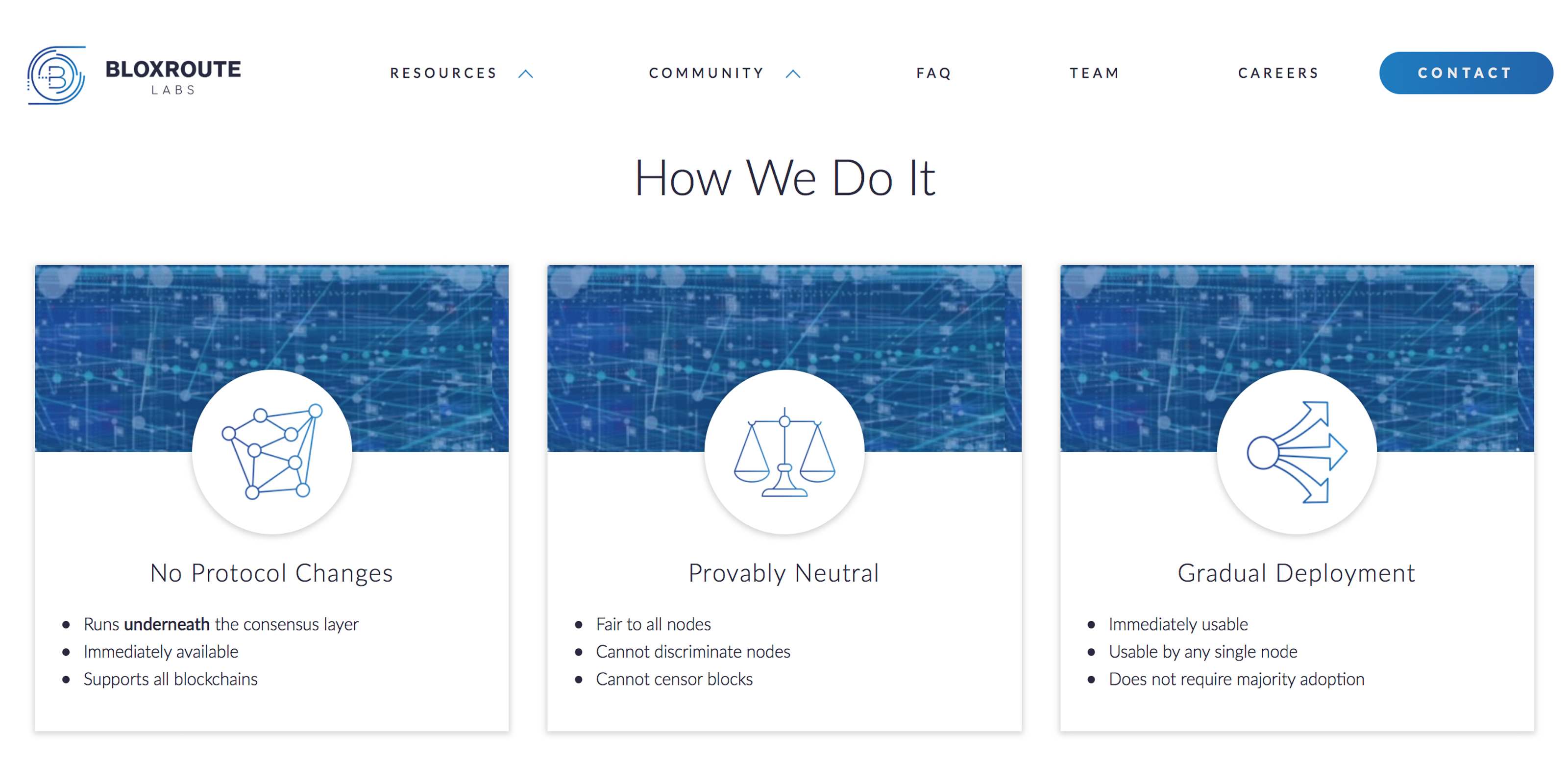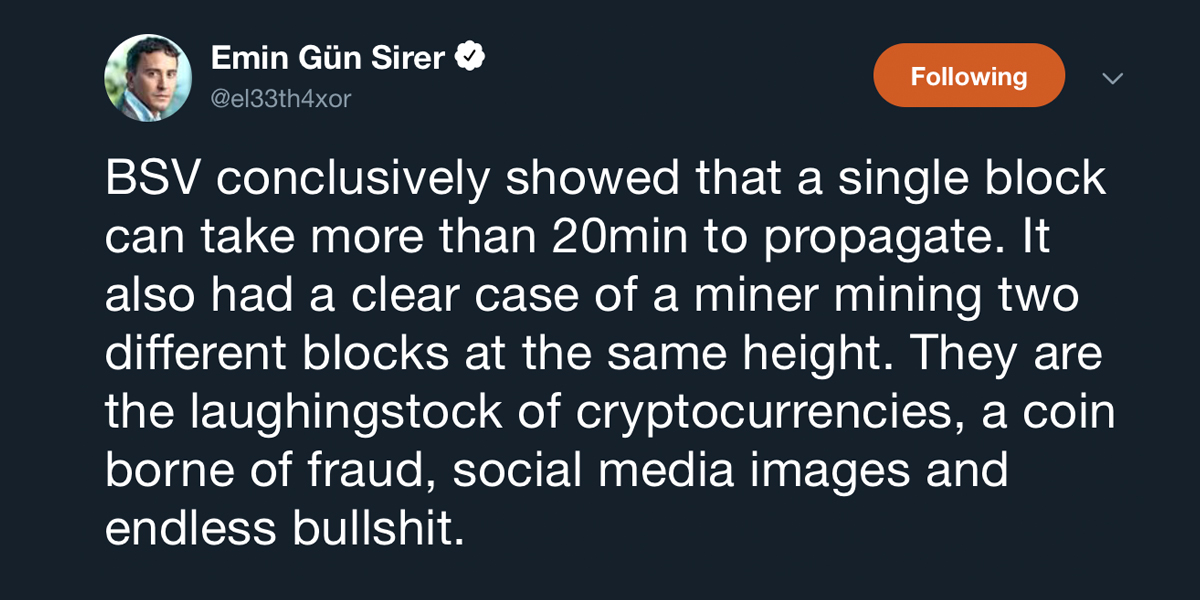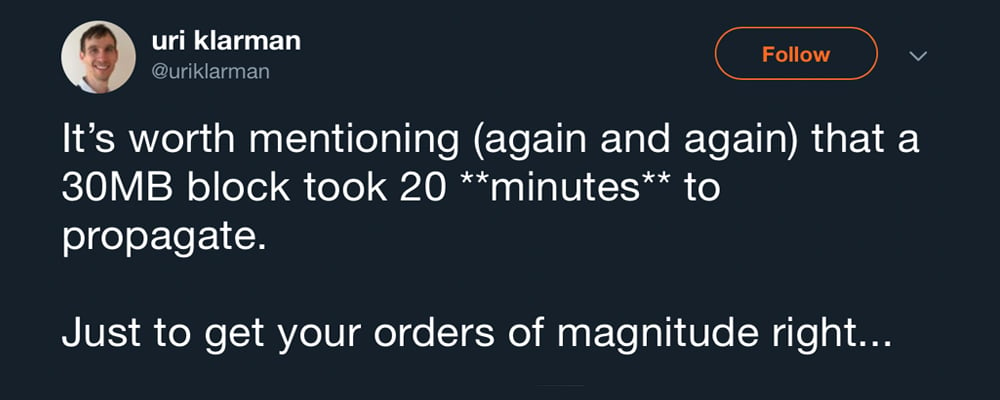
Over the last few weeks, the Bitcoin Cash (BCH) community has been discussing how miners and nodes will handle bigger blocks in the future to encourage mass adoption. A company called Bloxroute has been coming up a lot lately, as it aims to resolve the block propagation bottleneck.
Also read: Growing Number of Crypto Companies Operating From Belarus
Bloxroute Claims It Offers Greater Efficiency
 Bloxroute claims it can provide more efficient block propagation for blockchains. The organization has been discussed a lot in the weeks since researchers noted issues with block propagation after the BCH and BSV chains processed a few big blocks. Bloxroute says it supports any blockchain underneath the system by broadcasting block data in the exact same manner for every user in a neutral fashion.
Bloxroute claims it can provide more efficient block propagation for blockchains. The organization has been discussed a lot in the weeks since researchers noted issues with block propagation after the BCH and BSV chains processed a few big blocks. Bloxroute says it supports any blockchain underneath the system by broadcasting block data in the exact same manner for every user in a neutral fashion.
“In particular, Bloxroute propagates blocks without knowledge of the transactions they contain, their number, and the ‘wallets’ or addresses involved. Miners are free to include arbitrary transactions in a block,” the Bloxroute whitepaper explains. “Furthermore, Bloxroute cannot infer the above characteristics even when colluding with other nodes, or by analyzing blocks’ timing and size — Bloxroute cannot favor specific nodes by providing them blocks ahead of others, and cannot prevent any node from joining the system and utilizing it.”

Noticing Block Propagation Difficulties
Big blocks have been a topic of intense discussion over the last few weeks, especially within the Bitcoin Cash community. The week before the Nov. 15 hard fork, a few sizable blocks were processed on the BCH chain, including numerous 32MB blocks. After the blockchain split, BSV miners processed a 64MB block, marking the largest onchain block ever mined on a blockchain. However, huge blocks that have been mined in the past and blocks above a certain threshold usually have issues propagating across the network. This was noticed by many observers when BMG pool mined a 23.15MB Bitcoin Cash block that took well over an hour to propagate correctly.
“It took 85 minutes to find this block and the mempool was continuously growing at a rate that seems to be close to the limit nodes can accept transactions,” observed Jochen Hoenicke, the cryptocurrency developer otherwise known as “Johoe.”

Researchers noticed these issues when the concession of 32MB blocks was mined on the BCH chain. And the 64MB block found by BSV miners also had significant issues and took an extremely long time to propagate — some believe the BSV stress test pretty much DDoSed the nascent network. Another recent post on r/BTC explains how the BSV chain is showing issues with stuck Child-Pays-for-Parent (CPFP) transactions.

Hash War Winners or ‘Bloody Socialists’?
Since these issues started appearing, Bloxroute has come up more and more in the block size debate among people like Cornell University professor Emin Gün Sirer and Nchain’s chief scientist, Craig Wright. For instance, Gün Sirer told his Twitter followers on Nov. 23 that the hash war had shown that Bloxroute is an interesting protocol.
“The big winner in the hash war was, oddly, Bloxroute Labs. Coingeek demonstrated the importance of block propagation by accidentally selfish mining themselves. Anyone building high-performance blockchains needs to pay attention to the kind of things Bloxroute focuses on,” he said.

However, Wright and supporters of BSV don’t seem to see many benefits with Bloxroute’s technology. “[Bloxroute] will never see the light of day with SV. In Bitcoin … miners vote and miners can choose to orphan blocks,” Wright recently detailed to his Twitter followers. “Basically, this is the complete opposite of everything Bitcoin is about. And it also does not work.”
In another tweet, Wright claimed that Bloxroute proponents are “bloody socialists” and if miners cannot vote they are “neutered.” He continued by stating:
It is not scaling, it is removing miners from having a say.
Whether or not people agree with Bloxroute’s business model, its success or failure will be decided by the free market. If blockchain developers find use cases with this kind of system, it could theoretically thrive or simply introduce more problems. But no one can stop Bloxroute, as it’s free to provide these types of services in a permissionless fashion.
Uri Klarman, CEO of Bloxroute Labs, responded to Gün Sirer’s statements on Nov. 25, after the BSV chain had processed some larger blocks.
“Here’s why Bloxroute Labs is the big winner of the hash war: *Any* blockchain doing large blocks needs them to quickly reach other miners. Otherwise, they will mine empty blocks based on header and forks (orphans) — BSV just showed 30MB block take 20 minutes since they lack layer 0,” Klarman said.
What do you think about the Bloxroute protocol and business model? Let us know in the comments section below.
Images via Shutterstock, Bloxroute Labs, Twitter, and Pixabay.
Need to calculate your bitcoin holdings? Check our tools section.
The post Bloxroute Joins the Block Size Debate With New Block Propagation Service appeared first on Bitcoin News.
from Bitcoin News https://ift.tt/2AyIefE
via IFTTT


No comments:
Post a Comment